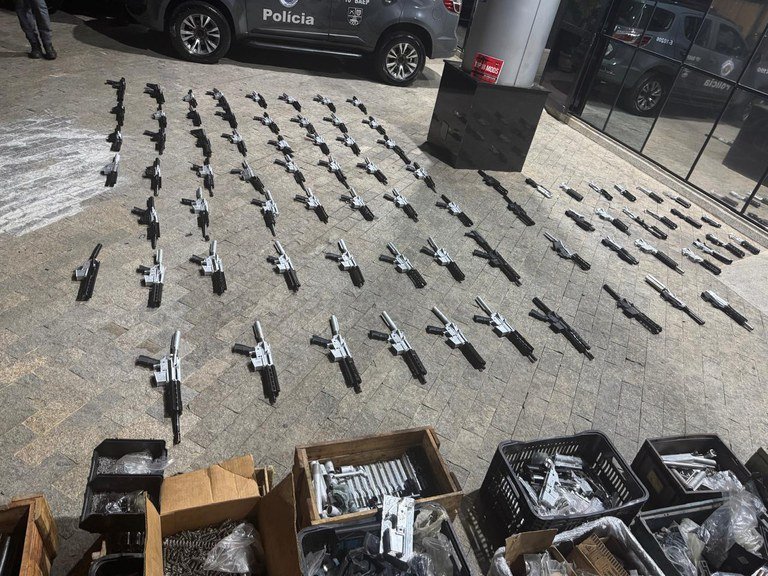The Federal Police, working in coordination with the Military Police, dismantled a clandestine arms factory on Wednesday (20) in Santa Bárbara d’Oeste, part of the metropolitan region of Campinas, in São Paulo’s interior. According to federal authorities, the site was dedicated to the production of rifles destined for criminal organizations operating in Brazil. Inside the facility, dozens of rifles and firearm components were found. Two men were taken into custody. During the raid, officers seized 40 AR-15 rifles that were already in the final stages of assembly, according to a statement from the São Paulo Public Security Secretariat (SSP-SP).
This Content Is Only For Subscribers
To unlock this content, subscribe to INTERLIRA Reports.
Machining and Production
Investigators determined that the factory was disguised as an aviation parts manufacturer, but it was equipped with state-of-the-art machinery capable of producing large-caliber weapons. Using advanced precision machining and specialized software, the group manufactured high-quality rifle parts. Authorities reported that at least 40 rifles could be produced from the seized components. Unlike conventional 3D printing, the machining process creates robust and durable parts, making them harder to detect and easier to circulate on the black market. According to the Federal Police, this industrial-level setup represented a sophisticated method of illegal weapons production.
Investigations
The operation was the result of an investigation launched ten days earlier, following intelligence reports that rifles were being illegally produced with high-precision industrial equipment. Officers monitoring the factory observed suspicious nighttime activity and decided to follow the suspects. Surveillance led them to a residence in Americana, a neighboring city, where boxes unloaded from a vehicle were found to contain rifle parts. Inside the property, additional rifles, ammunition, and firearm components were recovered. This discovery confirmed the scale of the operation and strengthened suspicions that the arms were intended for organized crime factions.
Arrests
Two men, aged 38 and 33, were arrested during the action while unloading weapon components at the Americana property. The older suspect is a resident of Campinas, while the younger is from São João da Boa Vista, both in São Paulo state. According to the Public Security Secretariat, the pair admitted to their involvement in weapons production and provided information about the warehouse where the rifles were being stored. The Federal Police stated that investigations will continue in order to trace the supply chain, identify additional collaborators, and dismantle the criminal network financing the operation.
Weapons Seized
In total, police confiscated 40 AR-15 rifles nearing completion, alongside ammunition and parts for further assembly. The clandestine factory was equipped with million-dollar high-precision machinery, demonstrating a level of investment and organization far beyond the typical illegal workshops. Intelligence from the Military Police indicated that these weapons were intended for distribution to criminal factions active in São Paulo and Rio de Janeiro, showing the seriousness of the operation and its potential impact on organized crime in Brazil.
Analysis:
The dismantling of the clandestine arms factory in Santa Bárbara d’Oeste reveals a significant escalation in the sophistication of criminal supply chains in Brazil. Unlike small-scale or improvised workshops, this operation relied on industrial-level machinery and specialized software, enabling the production of durable, high-quality rifles comparable to those manufactured legally. The fact that the facility was disguised as an aviation parts company reflects both the ingenuity of the group and the difficulty authorities face in identifying such operations before they become fully operational.
The discovery of 40 AR-15 rifles ready for distribution shows the direct link between illicit arms production and the strengthening of organized crime factions, particularly in São Paulo and Rio de Janeiro. Access to this type of weaponry not only increases the firepower of criminal groups but also heightens the risks faced by security forces and communities. The case demonstrates the importance of integrated intelligence between federal and state agencies, as well as the urgent need to strengthen monitoring of industrial equipment sales and supply chains.
Sources: G1 [1], [2]; A Folha de SP; Metrópoles.




